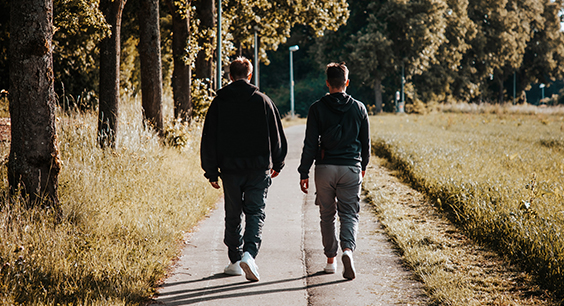The Way Back Support Service (TWBSS) supports people in the first few months following a suicide attempt. An initiative of Beyond Blue, the program is delivered by Woden Community Service (WCS) and funded by both the Commonwealth Department of Health and ACT Health through CHN, ACT’s PHN. People who have experienced a suicide attempt are referred to the program by hospital emergency departments, mental health units, as well as the Community Mental Health Service for follow-up psychosocial support which can last up to 12 weeks. This is seen as a critical suicide prevention aftercare response for a person at a high-risk time and is a key element of the LifeSpan integrated framework for suicide prevention.
Over the last year, WCS received 325 referrals, including 305 for individuals who had attempted suicide and 20 for those experiencing a suicidal crisis. They provided non-clinical after care service to 305 individuals through TWBSS and 100% of those individuals surveyed said that they felt supported, understood and encouraged, and that they felt it was a useful service for the community.
Client story
Jack (pseudonym) is in his early 20s and consented to TWBSS following two suicide attempts after a relationship breakdown. He was initially reluctant to accept supports. He was considerate of others needs and found it difficult to put his own needs first and this took some time to be revealed.
Jack had difficulty holding emotions particularly the distress of the relationship breakdown and was reluctant to let go of what had happened. Over the 12 weeks, he opened up and gained trust with a male Support Co-ordinator while exploring different environments and activities across Canberra. The different physical environments opened up conversations including sexual identity.
Jack was able to understand his family in a different way and made steps to greater independence and greater control of himself with a reduction in blame and the need for people to be a particular way for him to be ok. He started going to the gym and made changes to his sleep and food routines. At the end of the 12 weeks, he had applied for an Open University course in engineering and had a vision for the future.
“It was an excellent service and my Support Coordinator took the time to properly listen to difficult things and to understand them. It was casual and chilled and nothing was pushed. I felt I had someone to talk to about anytime so it opened me up to better communication of how I felt and to deal with it. The tools were really useful. It was a good way to check where my head was at and to keep track of my progress as well. He was an excellent guy. He really understood and cared. It felt great talking to him even when talking about the hard stuff. It really helped me to put things in perspective. Thank you.”

CHN Annual Report 2020-21 - Contents (click to expand)
Contents
- From the Chair and CEO
- COVID-19 response
- Priority areas
- Workforce
- Care across the continuum
- Vulnerable groups
- Mental health
- Regional Mental Health and Suicide Prevention Plan
- Borderline Personality Disorder: Dialectical Behaviour Therapy for Emerging Adults
- Mental health services for young people: headspace
- Mental health services for the LGBTIQA+ population: Inclusive Pathways
- Mental health support: Next Step
- Psychosocial support for people with severe mental illness
- National Psychosocial Support Transition and Continuity of Support
- Therapeutic service for children: Stepping Stones
- Support following a suicide attempt: The Way Back Support Service
- Aged Care
- Aboriginal and Torres Strait Islander health
- Digital health
- Alcohol and Other Drugs
- Chronic disease management
- Financial Statements
